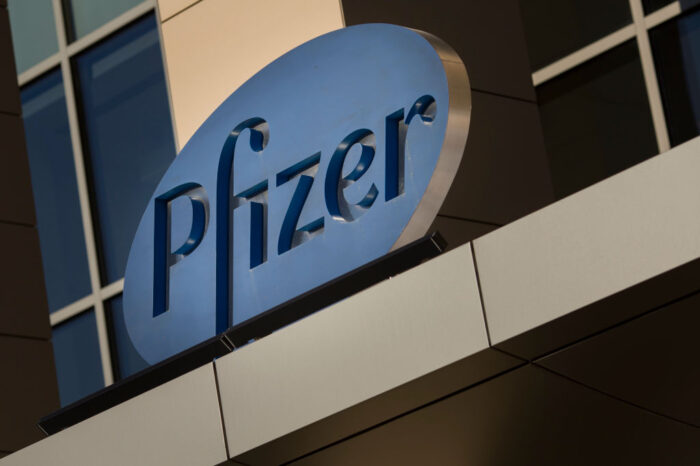
The entrance to a Pfizer office in Cambridge, Massachusetts
The messenger RNA technology that Pfizer and BioNTech used to successfully develop a Covid-19 vaccine is the basis of a new alliance that has the two companies working together to develop a shingles vaccine—the third partnership between the companies. When their Covid-19 alliance started in 2020, the two companies had already been collaborating on an influenza vaccine since 2018.
Pfizer brought its vaccine expertise and substantial cash to those alliances, but with the new collaboration in shingles it’s bringing something more. The shingles vaccine will be based on proprietary antigen sequences identified by Pfizer. Under the agreement, Pfizer is paying BioNTech $225 million up front to kick off the new partnership, the companies announced Wednesday. That payment breaks down to $75 million cash and a $150 million equity investment. BioNTech will pay Pfizer $25 million up front for the pharmaceutical giant’s antigen sequences. Vaccine development costs will be shared; a clinical trial is expected to begin in the second half of this year.

Transforming Clinical Content with Ambient & Generative AI
Sheila Bond, MD, talked about the latest trends regarding integration of AI in healthcare.
Shingles is a viral infection caused by the same virus that causes chickenpox. Following chickenpox infection, the virus remains dormant in nerve tissue but can reactivate later in a person’s life from triggers such as stress or a weakened immune system. Reactivation can spark nerve pain; in rare cases it leads to facial paralysis, deafness, and blindness.
Vaccines have already been developed for shingles, but they have limitations and safety risks. Merck’s Zostavax, made from a live but weakened form of the varicella zoster virus that causes shingles, was approved by the FDA in 2006 for shingles prevention in those 50 and older. However, the vaccine’s effect lasts only about five years, so the Centers for Disease Control and Prevention’s advisory committee on vaccines recommended that the shot be given to those 60 and older, giving people protection in the age range where the risk of shingles and its complications is greatest. Label updates in 2019 flagged the rare side effect risks of Guillain Barré syndrome, in which the immune system damages the nerves, as well as facial paralysis.
In 2020, Merck stopped selling Zostavax in the U.S. The company said in a letter to clinicians that the decision was not due to any safety or manufacturing issues. Zostavax’s exit left the U.S. shingles market to GlaxoSmithKline’s Shingrix, which received FDA approval in 2017. Unlike the Merck vaccine, Shingrix is not made from a live virus, rather it is a recombinant vaccine containing antigens that prompt an immune response. The two-shot GSK regimen posted higher efficacy results than Merck’s single shot vaccine. But Guillain Barré is also a risk of the GSK vaccine.
An mRNA shingles vaccine with efficacy and tolerability that is better than or at least comparable to Shingrix would position Pfizer and BioNTech to steal market share from their rival’s blockbuster product. GSK reported £502 million in global third quarter 2021 sales for Shingrix, a 34% increase compared to the third quarter of 2020. For the nine months ending Sept. 30, the vaccine accounted for £1.1 billion in revenue. That’s a 16% decline compared to the same period in 2020, a change that the company attributed to the prioritization that governments have placed on Covid-19 vaccination programs during the pandemic.

Solera Health’s Playbook To Beat Rising Employer Expenses
Solera Health is working to streamline employer contracting with health tech.
If Pfizer and BioNTech vaccine succeed in securing regulatory approvals for an mRNA shingles vaccine, commercialization will be split between the two companies. Pfizer has the right to market the shingles vaccine globally, with the exception of Germany, Turkey, and certain unspecified developing countries where BioNTech holds commercialization rights. Gross profits from sales of the shingles vaccine will be shared. BioNTech would also be eligible for regulatory and sales milestone payments that could reach $200 million.
“The collaboration aims to develop a new mRNA-based vaccine against shingles, leveraging the expertise and resources of both companies,” Ugur Sahin, BioNTech co-founder and CEO said in a prepared statement. “Adults aged 50 years and older as well as vulnerable populations like cancer patients are at an increased risk of shingles. Our goal is to develop an mRNA vaccine with a favorable safety profile and high efficacy, which is at the same time more easily scalable to support global access.”
Photo: Dominick Reuter/AFP, via Getty Images






